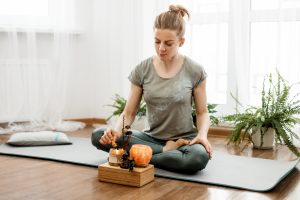5 Simple Ways To Boost Your Mental Health And Wellbeing Today

In today’s fast-paced world, mental health and wellbeing are often neglected due to our busy lifestyles. However, taking care of our mental health is as important as taking care of our physical health. Ignoring mental health could weaken our immunity, adversely affect our relationships and professional lives, and even lead to severe mental health disorders. Mental wellbeing refers to the state of being happy, healthy, and content in life. Our mental health is vastly influenced by various factors such as our daily routine, relationships, environment, stress levels, and emotional wellbeing. In this article, we will discuss five simple ways to improve mental health and wellbeing that can be easily incorporated into daily life to lead a more satisfying and fulfilling life.
Definition of Mental Health and Wellbeing
Mental health and wellbeing are an essential part of our lives that shape our everyday experiences. Our mental health refers to our psychological and emotional well-being, while wellbeing is the overall state of being comfortable, healthy, and happy. It is essential to maintain a balance between physical and mental health to thrive in every aspect of life. In this blog post, we will discuss five easy ways to boost mental health and overall well-being.
Benefits of Improving Mental Health and Wellbeing
Taking care of our mental health and wellbeing is incredibly important if we want to live fulfilling and rewarding lives. Investing in our mental health can lead to positive results such as stronger and more meaningful social relationships, reduced stress levels, and an overall improved quality of life.
By taking steps to improve our mental health, we can learn to better manage stressful situations and create a more positive outlook on life. This, in turn, leads to improved mental wellness. When we have a positive outlook on life, we are better equipped to handle the stresses of everyday life. We are also better able to build and maintain healthy relationships with family, friends, and our wider community.
Benefits of improving mental health extend beyond just emotional and social improvements. There is also a link between good mental health and physical health. Mental distress can often lead to physical health issues, and vice versa. For example, when we feel better mentally, we tend to have higher energy levels, which makes it easier to exercise and maintain a healthy diet. This can lead to a lower risk of depression and other mental health disorders.
By working to achieve a positive outlook on life and improving our mental wellness, we can enjoy a better quality of life overall. We can experience greater moments of joy, create stronger relationships, and better manage everyday stress. In order to achieve this, there are many strategies we can use such as regular exercise, spending time outdoors, making time for family and friends, and practicing mindfulness exercises like meditation or deep breathing.
1. Get Plenty of Rest
Getting enough restful sleep is crucial for our overall mental health and well-being. The recommended amount of sleep for adults is 7-9 hours per night. However, many of us fall short of this target, which can have consequences for our mental health.
Sleep deprivation can increase stress levels and contribute to symptoms of depression. When we don’t get enough sleep, we find it harder to deal with life’s challenges. We may struggle to focus, feel moody and have difficulty regulating our emotions. Over time, chronic sleep deprivation can exacerbate mental health problems and negatively impact our quality of life.
To improve the quality and duration of our sleep, there are practical tips and strategies we can use. Establishing a regular bedtime routine can help signal to our bodies that it’s time to rest. This can include relaxing activities like reading, taking a bath or practicing a breathing exercise.
Creating a sleep-conducive environment can also be helpful. A comfortable mattress and pillow, cool temperatures, and a quiet and dark room can all contribute to a better sleep experience. Avoiding electronics in the bedroom, particularly before bedtime, can also reduce sleep disturbances.
Another method to improve rest is through power naps. A power nap is a short, restorative break that can improve our mood and energy levels. A nap of 20-30 minutes during the day can help us recharge and increase productivity.
2. Exercise Regularly
Regular exercise is one of the most effective ways to promote good mental health and wellbeing in our daily lives. Engaging in physical activity releases endorphins, which are natural chemicals in the brain that enhance mood and reduce feelings of stress and anxiety. The benefits of exercise for mental health have been extensively studied, and research consistently shows that it can help reduce symptoms of depression and anxiety, improve concentration and cognitive function, and increase self-esteem.
In addition to releasing endorphins, regular exercise also helps to reduce the levels of stress hormones in the body, such as cortisol and adrenaline. When we are stressed, these hormones can be harmful to our health in the long run, but exercise helps to reduce their potency in the body. This can help to alleviate feelings of tension and promote relaxation, which can lead to a more positive outlook on life overall.
There are many different types of exercise that can be incorporated into our daily lives to promote good mental health and reduce stress levels. Running, walking, cycling, swimming, and yoga are all excellent options that can be tailored to suit individual preferences and fitness levels. Even simple activities like gardening, dancing or housework can be effective at boosting mood and promoting relaxation.
Finding an exercise buddy or joining a group fitness class can also be helpful to increase social interaction and motivation. Having a workout partner can provide accountability and support, which can be particularly beneficial for those who struggle to stay motivated when exercising alone. Additionally, taking part in group fitness classes can provide the opportunity to meet new people and build stronger social connections, which has been shown to be beneficial for mental health and wellbeing.
3. Eat a Healthy Diet
Nutrition plays a crucial role in our overall health, including mental health and wellbeing. Eating a healthy diet can have a positive impact on our energy levels, mood and productivity. A balanced diet that is rich in essential nutrients can help to maintain healthy cognitive function and keep our brain functioning at its best.
To start with, foods that are high in omega-3 fatty acids, such as fatty fish like salmon, can improve mood and reduce the risk of depression. Whole grains, fruits and vegetables are also essential to a healthy diet, as they provide essential vitamins, minerals and fiber that can improve digestion and energy levels.
On the other hand, processed foods or sugary snacks can lead to fluctuations in mood and energy levels. These foods may provide a temporary boost, but the blood sugar crash that follows can leave us feeling anxious, irritable or tired.
Mindful eating is a concept that encourages us to pay attention to what we eat and how we eat it. Eating mindfully helps us to stay in tune with our body’s signals and can help us to enjoy our food more. One tactic is to prioritize nutrient-dense foods that provide essential vitamins and minerals that our body and mind need to function properly.
Eating with others is another way to support a healthy diet. Sharing meal times with family or friends can provide a sense of connection and foster positive social relationships, which can also have a positive impact on mental health. Also, trying out different restaurants or cuisines can add variety to the diet and provide a new and enjoyable experience.
4. Take Time to Connect with Others Socially
Maintaining social connections is a vital aspect of maintaining excellent mental health. It is important to nurture relationships with loved ones and build new connections with others to ensure a fulfilling and rewarding life. Social connections can provide emotional support, companionship, and a sense of belonging. In this article, we will explore the significance of social connections and share some simple ways to connect with others socially.
One great way to connect with others is to spend time with family and friends. Whether it’s having dinner together, watching a movie, or going on a hike, spending time with people who matter most can be extremely beneficial in reducing stress levels and promoting happiness. It provides an opportunity to share experiences, express emotions, and make memories that can last a lifetime.
Another effective way to connect with others is by joining clubs or organizations. This can include sports teams, book clubs, hobby groups, or charitable organizations. Joining a group will allow you to meet new people with similar interests and form meaningful connections while engaging in an activity you enjoy.
Volunteering is another way to connect with others while giving back to the community. It provides an opportunity to contribute to a cause you believe in and meet others who share similar values and goals. Research has shown that volunteering can reduce stress levels and increase happiness, making it beneficial for both the community and the individual.
Participating in community events is also a great way to connect with others. This includes attending concerts, fairs, farmer’s markets, and other local gatherings. It provides an opportunity to meet new people, experience new things and support local businesses and communities.
5. Practice Mindfulness and Relaxation Techniques
In today’s busy life, it can be challenging to find time for mental wellness. However, incorporating mindfulness and relaxation techniques into your daily routine can significantly benefit your mental health and wellbeing.
Here are five simple ways to practice mindfulness and relaxation techniques:
1. Mindfulness Meditation:
Mindfulness meditation is a popular practice that involves focusing on the present moment without judgment. It can help individuals regulate stress and anxiety levels by bringing them to the present moment. Find a quiet and comfortable place, close your eyes, and focus on your breath. Notice the rise and fall of your chest with each inhale and exhale. If your mind wanders, gently refocus your attention on your breath.
2. Deep Breathing Exercises:
Deep breathing exercises can calm the mind and improve mental clarity. Find a quiet place and sit comfortably. Take a deep breath in through your nose for four seconds, hold for four seconds, then exhale for four seconds. Repeat this technique for several minutes, focusing on your breath.
3. Progressive Muscle Relaxation:
Progressive muscle relaxation is a technique that involves tensing and relaxing different muscle groups throughout the body. Find a comfortable place to sit or lie down, and start by tensing your toes for a few seconds. Release, and then move up to your feet, ankles, and so on, until you reach your forehead.
4. Guided Meditations:
Guided meditations can be extremely beneficial for those new to meditation. Many apps and websites offer guided meditations on various topics such as stress reduction, sleep, and anxiety. Find a guided meditation that fits your needs, and dedicate a few minutes each day to practicing it.
5. Create a Relaxing Environment:
Create a relaxing environment to help with relaxation and mindfulness. Add calming sounds, such as ocean waves or bird chirps, and burn incense or diffuse essential oils. Find a quiet and comfortable spot, and dedicate a few minutes each day to relaxing in this space.

Conclusion
In summary, prioritizing one’s mental health and wellbeing is just as important as physical health. Incorporating mindfulness and relaxation techniques into daily life can significantly improve mental wellbeing, reduce stress levels, and increase overall happiness. It’s crucial to actively take steps towards improving one’s mental health on a daily basis through techniques such as mindfulness meditation, deep breathing exercises, progressive muscle relaxation, guided meditations, and creating a relaxing environment. Remember, it’s okay to seek professional support if necessary. Let’s all prioritize our mental health and make it a daily practice to live a rewarding life.







